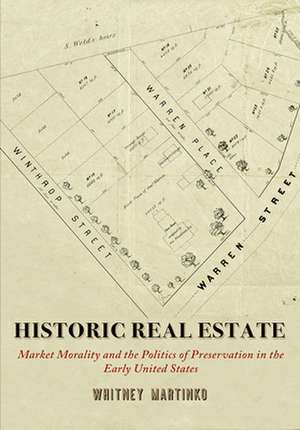Historic Real Estate – Market Morality and the Politics of Preservation in the Early United States: Early American Studies
Autor Whitney Martinkoen Limba Engleză Hardback – 14 mai 2020
In Historic Real Estate, Whitney Martinko shows how Americans in the fledgling United States pointed to evidence of the past in the world around them and debated whether, and how, to preserve historic structures as permanent features of the new nation's landscape. From Indigenous mounds in the Ohio Valley to Independence Hall in Philadelphia; from Benjamin Franklin's childhood home in Boston to St. Philip's Episcopal Church in Charleston, South Carolina; from Dutch colonial manors of the Hudson Valley to Henry Clay's Kentucky estate, early advocates of preservation strove not only to place boundaries on competitive real estate markets but also to determine what should not be for sale, how consumers should behave, and how certain types of labor should be valued.
Before historic preservation existed as we know it today, many Americans articulated eclectic and sometimes contradictory definitions of architectural preservation to work out practical strategies for defining the relationship between public good and private profit. In arguing for the preservation of houses of worship and Indigenous earthworks, for example, some invoked the public interest of their stewards to strengthen corporate control of these collective spaces. Meanwhile, businessmen and political partisans adopted preservation of commercial sites to create opportunities for, and limits on, individual profit in a growing marketplace of goods. And owners of old houses and ancestral estates developed methods of preservation to reconcile competing demands for the seclusion of, and access to, American homes to shape the ways that capitalism affected family economies. In these ways, individuals harnessed preservation to garner political, economic, and social profit from the performance of public service.
Ultimately, Martinko argues, by portraying the problems of the real estate market as social rather than economic, advocates of preservation affirmed a capitalist system of land development by promising to make it moral.
Din seria Early American Studies
-
 Preț: 193.04 lei
Preț: 193.04 lei -
 Preț: 270.56 lei
Preț: 270.56 lei -
 Preț: 249.67 lei
Preț: 249.67 lei -
 Preț: 243.06 lei
Preț: 243.06 lei -
 Preț: 196.55 lei
Preț: 196.55 lei -
 Preț: 191.59 lei
Preț: 191.59 lei -
 Preț: 244.14 lei
Preț: 244.14 lei -
 Preț: 242.82 lei
Preț: 242.82 lei -
 Preț: 245.01 lei
Preț: 245.01 lei -
 Preț: 193.68 lei
Preț: 193.68 lei -
 Preț: 248.56 lei
Preț: 248.56 lei -
 Preț: 195.13 lei
Preț: 195.13 lei -
 Preț: 197.59 lei
Preț: 197.59 lei -
 Preț: 290.05 lei
Preț: 290.05 lei -
 Preț: 329.77 lei
Preț: 329.77 lei -
 Preț: 198.22 lei
Preț: 198.22 lei -
 Preț: 245.25 lei
Preț: 245.25 lei -
 Preț: 195.13 lei
Preț: 195.13 lei -
 Preț: 196.14 lei
Preț: 196.14 lei -
 Preț: 196.14 lei
Preț: 196.14 lei -
 Preț: 195.73 lei
Preț: 195.73 lei -
 Preț: 194.91 lei
Preț: 194.91 lei -
 Preț: 243.06 lei
Preț: 243.06 lei -
 Preț: 192.22 lei
Preț: 192.22 lei -
 Preț: 196.14 lei
Preț: 196.14 lei -
 Preț: 284.57 lei
Preț: 284.57 lei -
 Preț: 196.14 lei
Preț: 196.14 lei -
 Preț: 281.27 lei
Preț: 281.27 lei -
 Preț: 193.04 lei
Preț: 193.04 lei -
 Preț: 285.30 lei
Preț: 285.30 lei -
 Preț: 245.25 lei
Preț: 245.25 lei -
 Preț: 249.67 lei
Preț: 249.67 lei -
 Preț: 247.43 lei
Preț: 247.43 lei -
 Preț: 210.64 lei
Preț: 210.64 lei -
 Preț: 245.25 lei
Preț: 245.25 lei -
 Preț: 195.13 lei
Preț: 195.13 lei -
 Preț: 283.46 lei
Preț: 283.46 lei -
 Preț: 281.27 lei
Preț: 281.27 lei -
 Preț: 283.46 lei
Preț: 283.46 lei -
 Preț: 245.25 lei
Preț: 245.25 lei -
 Preț: 252.96 lei
Preț: 252.96 lei -
 Preț: 245.25 lei
Preț: 245.25 lei -
 Preț: 195.13 lei
Preț: 195.13 lei -
 Preț: 236.22 lei
Preț: 236.22 lei -
 Preț: 246.37 lei
Preț: 246.37 lei - 15%
 Preț: 560.04 lei
Preț: 560.04 lei -
 Preț: 197.18 lei
Preț: 197.18 lei -
 Preț: 247.43 lei
Preț: 247.43 lei -
 Preț: 196.14 lei
Preț: 196.14 lei -
 Preț: 252.96 lei
Preț: 252.96 lei
Preț: 317.31 lei
Nou
Puncte Express: 476
Preț estimativ în valută:
60.72€ • 62.74$ • 50.51£
60.72€ • 62.74$ • 50.51£
Carte tipărită la comandă
Livrare economică 20 martie-03 aprilie
Preluare comenzi: 021 569.72.76
Specificații
ISBN-13: 9780812252095
ISBN-10: 0812252098
Pagini: 328
Dimensiuni: 187 x 260 x 29 mm
Greutate: 0.7 kg
Editura: MT – University of Pennsylvania Press
Seria Early American Studies
ISBN-10: 0812252098
Pagini: 328
Dimensiuni: 187 x 260 x 29 mm
Greutate: 0.7 kg
Editura: MT – University of Pennsylvania Press
Seria Early American Studies
Cuprins
Preface
Introduction. Architecture, Society, and Economy in the Early United States
I. Corporate Properties
Chapter 1. Capital Plans: Ancient Monuments in Public Squares
Chapter 2. Sacred Forms: Public Buildings and Urban Improvements
II. Commercial Sites
Chapter 3. The Business of Preservation: Antiquarian Views and Commercial Enterprise
Chapter 4. Moral Real Estate: Sacred Historic Space and the Politics of Speculation
III. Domestic Spaces
Chapter 5. Civic Housekeeping: Voluntary Associations and Domestic Economy
Chapter 6. Ancestral Estates: Patrimonial Property and Rural Improvement
Epilogue. Rethinking Mount Vernon and Its Legacy
Notes
Index
Acknowledgments
Notă biografică
Descriere
In Historic Real Estate, Whitney Martinko shows how early Americans debated whether, and how, to preserve historic structures as permanent features of the new nation's landscape. She argues that early advocates of preservation affirmed a capitalist system of land development by promising to make it moral.
